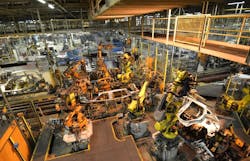“We are a manufacturing economy,” Stephen Bridges declares without hesitation.
That may come as a surprise to some observers on this side of the pond who equate the United Kingdom more with Downton Abbey than 3-D printing. But Bridges, a career diplomat who is serving as the British Consul General in Chicago, makes the same case as many of his peers in the United States – manufacturing is a vital part of the economy and the government is staunchly backing it.
Also reflecting the American experience, Great Britain hopes it has come out of the global recession with a manufacturing sector that is smaller but more agile, more technology-intensive and more focused on global markets. Here’s what the industry looks like now:
- The United Kingdom is the 11th largest manufacturing economy in the world, according to the United Nations, with manufacturing value-added totaling $219 billion in 2012.
- Manufacturing employs approximately 2.5 million people in the UK.
- Manufacturing accounts for nearly half of Britain’s exports, and more than 70% of business research and development.
“There has been a lot of rhetoric that manufacturing and engineering is dead in the U.K,” says Bridges, who has called Chicago home for the last five months. “It is not the smokestack industry that it was in the early 20th, late 19th century. We have moved toward a more knowledge-based, service driven economy, but we are still a major, major manufacturing center.”
At the World Economic Forum in Davos, Switzerland in January, Prime Minister David Cameron pointed to the reshoring trend affecting the U.K. and other developed nations.
“A recent survey of small and medium sized businesses found that more than 1 in 10 has brought back to Britain some production in the past year. More than double the proportion sending production in the opposite direction,” said Cameron, adding, “I think there is a chance for Britain to become the ‘Re-Shore Nation.’”
Bridges’ job in part is to make sure that British manufacturing grows, through promoting British exports and attracting U.S. investment to the U.K. He points out that while the history between the United States and the United Kingdom is sometimes “taken for granted,” the countries’ ties run deep and offer a level of assurance that many other areas of the globe can’t match.
“Investors know what they are going to get in the UK,” Bridges notes. “The U.S. is still the biggest investor in the U.K. and the U.K. is still the biggest investor in America.” In fact, the United Kingdom accounted for 17.1% of foreign direct investment in the U.S. from 2010 to 2012, and U.S. investments in the U.K. were nearly twice that of the next nation, according to Britain’s Office of National Statistics.
The U.K. offers other reasons for U.S. investment, says Bridges, including a common language, a strong culture of innovation, highly skilled workers and a flexible labor market. It also offers easy access to the European Union’s 500 million people and, he claims, serves as a “crossroads” for companies dealing with both the United States and Africa and Asia.
Like the U.S., the United Kingdom is focused on attracting and growing advanced manufacturing, which Bridges calls a euphemism for “automotive and aerospace.” He cited some recent investments being made by major manufacturers in Great Britain:
- Ford’s “European transformation” meant closing its Transit van factory in Southampton and its stamping and tooling operations in Dagenham, but Bridges points out that the company is spending more than $500 million on R&D at its facility in Dunton, Essex. Ford (IW 1000/25) will develop a new low-emission diesel engine at Dunton and produce it at Dagenham.
- General Motors (IW 1000/19) is investing $200 million in its Elllesmere Port plant to build the next generation of Astra cars. The plant is adding 700 workers to its current workforce of 2,100 and will produce at least 160,000 cars annually. Moreover, GM expects to pump $1.6 billion into the UK supply chain, supporting another 3,000 jobs.
- Nissan (IW 1000/31) has invested more than $5.6 billion in its Sunderland plant since 1984. The plant employs more than 6,000 and produces over 550,000 vehicles annually. Nissan employs 11,000 people in the UK and supports a supply chain employing another 24,000 people.
Britain’s aerospace industry is the second largest, after the U.S., in the world. The $38 billion industry comprises 9,000 companies employing approximately 101,000 workers. The industry exports about 70% of its products.
Last March, the British government announced a public-private initiative to invest $3.2 billion to create an Aerospace Technology Institute. The institute will focus on research and development of lighter, faster, more fuel-efficient aircraft. Among the aerospace firms supporting the institute are Airbus (IW 1000/52), Rolls-Royce (IW 1000/234) and GKN Aerospace (IW 1000/432).
Promoting Trade and Investment
The UK Trade & Investment organization helps British companies find export opportunities in the U.S., but it also works with U.S. companies that want to expand their operations to the U.K. or look for additional business there. For example, UKTI recently hosted a trade mission by Philadelphia Mayor Michael Nutter and 60 U.S. companies to tour London’s Tech City and find out more about resources available to support both start-ups and larger companies.
“Some of them will be looking at the possibility of expanding their operations and using the U.K. as a base for their European, Asian and North American operations,” said Bridges.
Bridges emphasized that UKTI is not only focused on multinationals but works closely with manufacturers to identify gaps in the supply chain and strengthen the industrial ecosystem in Britain.
“We have established a Automotive Investment Organization that brings together experts from the industry. It is headed by the former chair of Ford U.K. His deputy is the former procurement director of GM in the U.K. We have people on the inside of the industry to tell us what the holes are. We work with them to reach out and identify companies. Also companies will come to us and say, ‘We are thinking about investing in the U.K. How can you help us?’”
Bridges said UKTI can help companies with site location and planning, legal and accounting advice, financial support in some cases for either greenfield or expansion projects, recruitment and training, and continuing access to government.
“We are an environment that caters to U.S. investors. We’re conscious of what their needs are,” said Bridges. “We’ve been doing this a long time,”
Bridges is hopeful that it won’t take a long time for the U.S. and European leaders to approve the Transatlantic Trade and Investment Partnership (T-TIP). The trade talks between the U.S. and the European Union began in July 2013 and could be concluded this year.
T-TIP is designed to reduce tariffs and duties on industrial and agricultural goods, increase access for service providers, strengthen intellectual property protections and make regulations more compatible while maintaining appropriate levels of safety, health and environmental protections. By some estimates, the agreement could boost the U.S. economy by $144 billion and the EU’s economy by $192 billion.
“With in essence a moribund WTO, we don’t have the global trade and investment structure that we should have,” Bridges observed. “This is a possible way of kickstarting it.”
Contrasting this effort with other trade deals, Bridges said T-TIP “is not about relocation of work. This is about job creation.” Citing a study by the British Embassy in Washington, Bridges said T-TIP could, for example, increase exports to the EU from Ohio by 35% and create 27,000 jobs in the state. The EU purchased $8.6 billion in goods and $4 billion in services from Ohio in 2012.
“You put a 35% growth on that and you are talking serious money,” said Bridges.
About the Author
Steve Minter
Steve Minter, Executive Editor
Focus: Leadership, Global Economy, Energy
Call: 216-931-9281
Follow on Twitter: @SgMinterIW
An award-winning editor, Executive Editor Steve Minter covers leadership, global economic and trade issues and energy, tackling subject matter ranging from CEO profiles and leadership theories to economic trends and energy policy. As well, he supervises content development for editorial products including the magazine, IndustryWeek.com, research and information products, and conferences.
Before joining the IW staff, Steve was publisher and editorial director of Penton Media’s EHS Today, where he was instrumental in the development of the Champions of Safety and America’s Safest Companies recognition programs.
Steve received his B.A. in English from Oberlin College. He is married and has two adult children.

